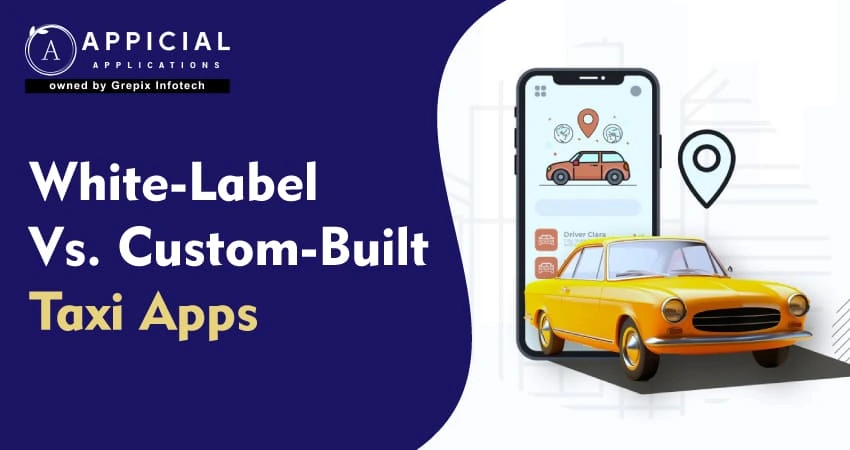
White-Label vs. Custom-Built Taxi Apps: A Complete Comparison
The ride-hailing segment of the transportation industry is estimated to surpass USD 175.70 billion by 2025, with a compound annual growth rate of 4.91% from 2025 to 2029.
This shows an unprecedented increase in the popularity of ride-hailing applications and an expanding market. For an entrepreneur looking to start a taxi business, or even someone looking to improve their existing business, this is the perfect opportunity.But here comes the major question: should you aim for a white-label taxi app and launch straight away, or create a custom taxi app to perfectly fit your business model? That is quite a dilemma.
Each day spent mulling over the decision will translate to lost brand-building opportunities.With the increase in competition, choosing the right type of software will be the deciding factor in your growth.This is why this article aims to explain both alternatives so you can make an informed decision for your business.
Choosing between a white-label taxi app and a custom taxi app depends on your goals, budget, and timeline. A white-label solution, often modeled as an Uber clone, offers a fast, cost-effective, and branded launch with essential features pre-built. However, it limits customization and scalability. On the other hand, custom taxi app development provides full control, tailored features, and long-term flexibility, but at a higher cost and longer development time. If speed and budget matter, go white-label. If you need uniqueness and scalability, go custom. Make sure you align the approach with your business vision for the best results.
What is White-Labeling?
A white-label taxi app is similar to the process of purchasing a well-furnished house. The walls, rooms, and systems are already installed. You simply add a coat of paint to the walls with your desired color, put your name on the door, and move in. You don't have to construct anything from the ground up.
A white-label taxi app is a pre-made solution developed by an app company. They are selling this application to other companies, so each of these buyers gets to put their own logo, colors, and brand name on it. But under the hood, it remains the same architecture. It's less expensive, quicker, and market-tested already. You can compare it to obtaining an Uber clone, but branded as yours.
Comparison with Custom Apps
So, how is a custom taxi app different? Well, think of it like constructing a house from the ground up. You design it, you pick the materials, and you decide on the layout. Every single thing is done for you and by you. It costs more time and money, but you get what you want.
If you develop a taxi app like Uber in India, you will probably spend between $15,000 and $30,000. The overall price will depend on how complicated the app is and what features you implement. If you have a simple app with basic booking, maps, and payment, it will be cheaper. However, if you implement sophisticated features like real-time tracking, driver ratings, or chat support, it will become more expensive. The more custom elements you implement, the longer and costlier it is to create the app.
Let's put the two next to each other:
| Feature | White-Label Taxi App | Custom Taxi App |
|---|---|---|
| Development Time | Very fast (days to weeks) | Slow (months or more) |
| Cost | Budget-friendly | Expensive |
| Flexibility | Limited customization | Fully flexible |
| Tech Control | Vendor-controlled | Full control |
| Support & Maintenance | Provided by vendor | Handled by your team or vendor |
| Launch Speed | Fast track to market | Slower, needs testing and revisions |
White-Label Taxi App: Pros and Cons
Let's get a closer look at why a white-label taxi app is a good idea - and where it may fall short.
Pros
- Quick Setup: The greatest benefit of a white-label taxi app is speed. You can have your app live in a few days. Because the underlying technology is already developed, you simply need to include your brand touches and go live.
- Lower Cost: In contrast to creating an app from the ground up, a white-label taxi app is much cheaper. You don't have to employ designers, developers, or testers. It's inexpensive, particularly for startups or beginner founders.
- Ready-to-Use Features: The apps are loaded with all the essentials, like user sign-up, GPS, fare computation, driver panels, and payment integrations. It's there, pre-tested, and you can use it straight away.
- Market-Proven Reliability: Because this type of app has already been implemented by others in the business, bugs and issues have already been resolved for the most part. That means less trouble for you - and a more seamless experience for your users.
- Branded Experience: Although it's not developed from scratch, you can still personalize the appearance and feel. You can include your own logo, color scheme, and business name, providing a branded experience for your users.
Cons
- Limited Customization: You get what's pre-built into the app. If you need a special feature or design, it's not necessarily an option. You'll be restricted to whatever the original developer has permitted.
- Vendor Lock-In: You are totally dependent on the vendor for support, fixes, and updates. If they discontinue support, you're trapped or have to begin anew.
- No Unique Selling Point: Because numerous companies employ the same Uber clone template, your app will seem and feel generic relative to others in the space. It is more difficult to differentiate.
- Scalability Problems: As your business expands, the app might not support greater operations efficiently. Scaling a white-label taxi app can be tricky without complete access to the backend.
- Data Control Limitations: Certain white-label solutions don't provide complete control over user data or analytics. This might complicate your ability to learn about your audience and enhance your service.
Also Read: What is white label taxi app and their pros & cons?
Custom Taxi App: Pros and Cons
A custom taxi app provides you with complete freedom. From the user interface to unique features, everything is designed according to your vision. But this freedom comes at a cost, with increased expenses, longer development time, and greater responsibility. Let's break it down!
Pros
- Tailor-Made Features: You decide exactly what goes into the app. If you want to add a panic button, loyalty points, or AI-powered route suggestions, you can go for it. A custom taxi app allows you to build features that meet your unique business goals and user needs.
- Unique Experience: Your app is not going to look or feel like anybody else's. You're not launching some other Uber clone, you're building something of your own. This differentiates you in a busy market.
- Full Control Over Design and Tech: From the design of the app itself to the server it resides on, all aspects of the system are in your hands. You get to choose which tools to use, how frequently to push updates, and how to handle scale.
- Better Long-Term Growth: While your company grows, so does your custom app. You can add new services and features without restriction, which is important for long-term success in taxi app development.
- Data Ownership: All of your driver and user data belongs to you. This provides important information on behavior, preferences, and market trends, allowing you to make better decisions.
Cons
- Higher Development Costs: Developing a custom taxi app is costly. You must employ talented developers, designers, testers, and sometimes even project managers. It's a heavy investment.
- Long Time to Market: A custom app does not materialize overnight. It might take a few months, or even a year, to develop, test, and deploy. If you need to launch quickly, this might hold you back. Technical Responsibilities: You're responsible for keeping the app up and running. Bugs, security holes, updates - you either deal with them or hire someone who can.
- Risk of Overbuilding: Occasionally, companies attempt to build too many features too early on, and that causes confusion and slowdowns. Keeping things basic in the beginning is usually a better idea.
- Maintenance and Upgrades: Tech changes fast. You’ll need to constantly update your app to stay compatible with devices, software, and user expectations. That means ongoing time and money.
Choosing the Right Approach!
Now that you’ve seen both sides, how do you decide? Ask yourself the following questions!
- How fast do I need to launch? If it's ASAP, go with a white-label taxi app.
- What’s my budget? Tight budget? White-label wins again.
- Do I need special features? If yes, consider a custom taxi app.
- Do I want to scale big in the future? Custom is better for complex growth.
- Do I want control over technology? A custom route lets you own your tech.
Also, think about your market. Are you trying to replicate a proven model like Uber? Then an Uber clone works perfectly. But if you want to offer something different - maybe luxury rides, or an eco-friendly fleet, a custom build lets you shape that story.
The Bottom Lines
Taxi businesses are booming, but only the smart movers stay ahead. Whether you choose a ready-to-go Uber clone or decide to build your own app from scratch, the key is to align your choice with your goals, time, and budget.
A white-label taxi app gives you a rocket start. You’ll be up and running fast, with minimal hassle. It is great for testing ideas, starting small, or entering the game quickly.
A custom taxi app, on the other hand, puts the power in your hands. It’s your vision, your features, your brand - no compromises. Whether it’s a unique booking flow, special payment options, or advanced safety tools, everything is shaped to fit your business.
So, take a deep breath. Map out your journey. Whether you choose the expressway of a white-label taxi app or the scenic route of custom development, the road to success is wide open. And remember, good business is not just about moving fast, it’s about choosing the right direction.
Looking out to start your own venture like Uber ? Try out our HireMe Taxi Uber Clone, the easiest way to kick-start your taxi business.
Author's Bio

Vinay Jain is the Founder at Grepix Infotech and brings over 12 years of entrepreneurial experience. His focus revolves around software & business development and customer satisfaction.
Back to blog list




